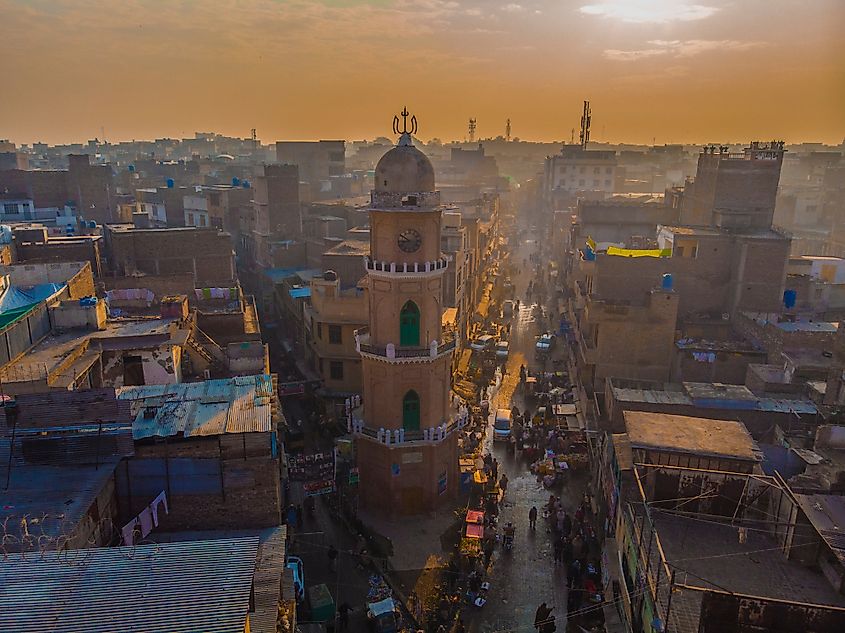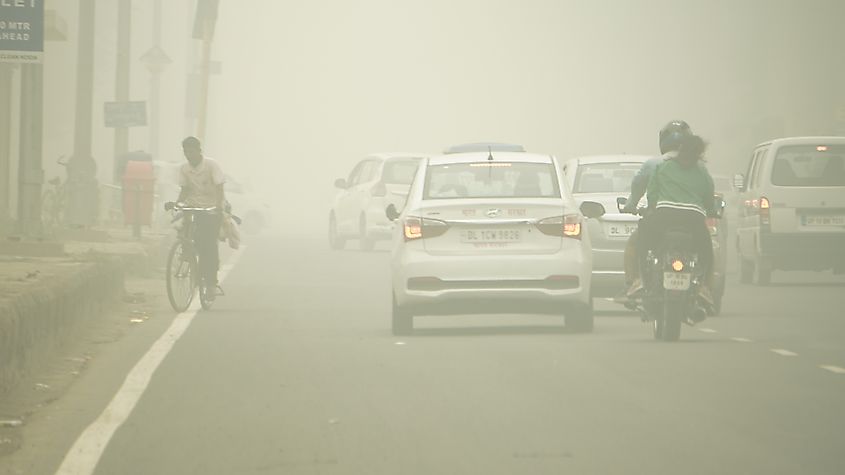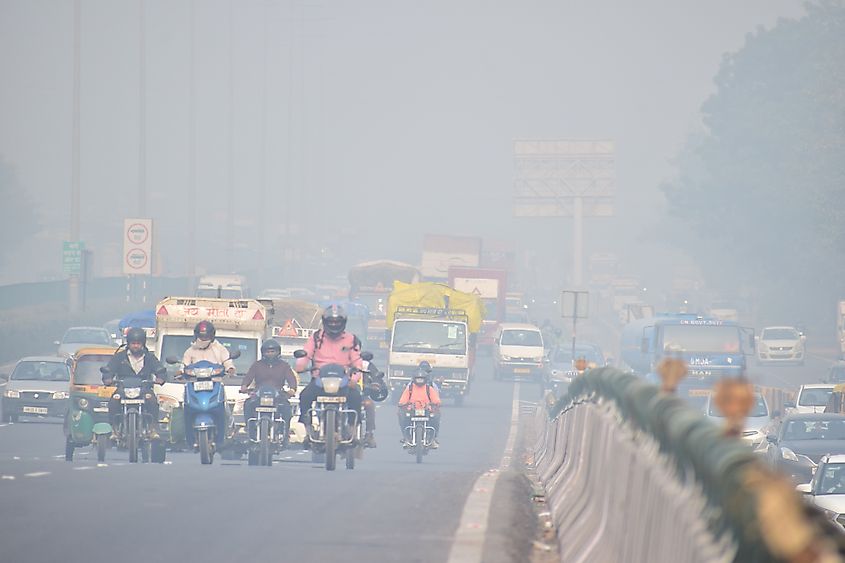Now, which cities throughout the world are the most polluted? Here is a list of the world’s most polluted cities, based on data from IQAir.
10. Baghpat, India
Bagpat is renowned as a new residential and industrial region since the population and businesses of its neighboring city, Delhi, are migrating to other nearby places (Bagpat being one of them) due to lack of women’s security and increased pollution levels. This have been happening for a couple of years now which gradually increased the burden on Bagpat. And this is to note that there are 38 air pollution monitoring systems in Delhi, since it’s the capital of India and one of the most polluted cities in the world, while other cities have 5 monitoring systems at most. Other reasons for the spike in pollution levels in Bagpat are due to stubble burning and lack of action plans to deal with pollution load. According to IQAir, the average PM2.5 ranking for Bagpat in 2021 is 89.1 µg/m3, which is 10 times higher than WHO’s guideline air quality standard.
9. Peshawar, Pakistan

According to a new research, Peshawar experiences alarming levels of air pollution. The city’s air pollution levels, particularly during the winter months, rank it among the world’s most contaminated. It has an influence on at least five million people’s health, raising public health expenses and lowering human development attainment. The main sources of pollution include vehicle and industrial emissions, in addition to waste incineration. According to IQAir, the average PM2.5 ranking of Peshawar in 2021 is 89.6 µg/m3, which is 10 times higher than WHO’s guidelines.
8. Bahawalpur, Pakistan
Bahawalpur is frequently second on the list of most polluted Pakistani cities, with an Air Quality Index (AQI) of approximately 150-200 on most days, putting vulnerable populations including children, the ill, and the elderly at a higher risk of respiratory difficulties. An AQI of up to 50 is deemed acceptable. As is common in many developing cities across the world, two of the biggest causes of air pollution are emissions from automobiles and industrial operations. Other sources include the use of biogas in many fields such as domestic uses, power generation, and waste incineration. According to IQAir, the average PM2.5 ranking of Bahawalpur in 2021 is 91 µg/m3, which is 10 times higher than WHO’s guidelines.
7. Noida, India

Noida, short for New Okhla Industrial Development Area, is a city with one of the world’s poorest air quality. Farmers in this town usually burn stubble during the harvesting season to clean their lands, which occurs in the dry season of the year where there’s no rain and wind to clean the atmosphere from any sort of dust and particulate matter. Second, the pollution at this time is produced by the common practice of setting off firecrackers during Diwali celebrations. These national festivals, which take place between October and November, contribute to the deterioration of air quality. According to IQAir, the average PM2.5 ranking of Noida in 2021 is 91.4 µg/m3, which is 10 times higher than WHO’s guidelines.
6. Faisalabad, Pakistan
Faisalabad is Pakistan’s third-largest city, occupying an area of 5,856 km2 and having a population of 3.54 million people. It is witnessing substantial expansion, both economically and in terms of population due to its central location in the country. In addition, it is a key industrial and communication hub in Pakistan, as different highways and railroads extend from it to other cities. Pollution levels in the city’s air are particularly high, as one would anticipate, from a quickly growing and heavily industrialized metropolis. Moreover, Faisalabad is the main center of the textile industry in Pakistan, which generates enormous amount of waste flowing into groundwater and pollution from coal-burning. Faisalabad came in with a PM2.5 reading of 94.2 µg/m3, which is 10 times higher than WHO’s guidelines according to IQAir.
5. Jaunpur, India
The air in Jaunpur has exhibited some seriously harmful readings, with December 2021 coming in with some rather serious values that can cause a wide range of health difficulties among Jaunpur residents. Jaunpur is now India’s fourth most polluted city. Jaunpur has numerous distinct pollution sources both within and outside of the municipal borders. These include wind current effects that can be bring dust and smoke from nearby cities. Human related causes of pollution in Juanpur include stubble burning, traditional methods of cooking, vehicle emissions and construction sites. According to IQAir, the average PM2.5 ranking of Juanpur in 2021 is 95.3 µg/m3, which is 10 times higher than WHO’s guidelines.
4. Delhi, India

The year-round average for PM2.5 pollution in New Delhi is by far the worst of any capital city in the world. Students in Northern India, particularly in India’s capital city of New Delhi, would face regular disruptions. Every year, when pollution rises, schools close for around two weeks. “Our children have worn masks to school since long before the Covid crisis,” one local resident said. The primary reasons of pollution in Delhi are numerous. To begin, one of the primary causes is, of course, automotive pollution. Farmers’ burning of plant residue or stubble to clear land following the September harvest have also contributed to deteriorating air quality. While there are many more causes of pollution and smog to be identified, the last major one to be discussed is the industrial sector, which, with a large number of factories and production plants, would also play a significant role in the release of smoke into the atmosphere. According to IQAir, the average PM2.5 ranking of Delhi in 2021 is 96.4 µg/m3, which is 10 times higher than WHO’s guidelines.
3. Hotan, China
Hotan Prefecture sits on the southern tip of China’s Taklimakan Desert, the world’s biggest shifting sand desert. The desert is a major source of regular sand-dust weather occurrences, which have a significant impact on the air quality in Hotan. In addition, toxins are released into the surrounding environment as a result of the area’s exponential industrial expansion, which affects Hotan’s residents. The 2021 report of IQAir shows a P2.5 average of 101.5, which is 10 times higher than WHO’s guidelines. This signifies that the particles in the air are small enough to reach the bloodstream and cause medical problems. Air pollution in this area is also linked more predominantly to coarse PM10 that also result from sandstorms.
2. Ghaziabad, India
Construction waste and unpaved roads were listed as the primary causes of pollution in Ghaziabad by the Uttar Pradesh Pollution Control Board. Industrial and automobile pollutants, as well as open-air waste burning, are all contributing to poor air quality in Ghaziabad. According to IQAir, the average PM2.5 ranking of Ghaziabad in 2021 is 102 µg/m3, which is 10 times higher than WHO’s guidelines. With such number, it is safe to assume that pollution-related illnesses are exceedingly high and dangerous.
1. Bhiwadi, India
Bhiwadi, an industrial town in Rajasthan’s Alwar district, has surpassed Delhi to top the world index of air pollution in 2021. The air quality in Bhiwadi was classified as “hazardous” at the start of the second quarter of 2021, with a US AQI value of 366. Dirt and dust were found to be responsible for 47% of the pollution in Bhiwadi. At the same time, 30% are from industries. Vehicles are responsible for 12% of pollution. The remaining pollution is caused by building activities and waste burning, among other things. According to IQAir, the average PM2.5 ranking of Bhidawi in 2021 is 106.2 µg/m3, which is 10 times higher than WHO’s guidelines. With such hazardous conditions, everyone should wear a high-quality face mask when stepping outside and avoid opening doors and windows.
Aside from being extremely detrimental to the human body, air pollution may also have an influence on the ecosystem, causing phenomena such as acid rain and lower crop yields, as well as reproductive failure and illnesses in wildlife species. The logical first step toward resolving the air crisis in these cities would be to make much more real-time air quality data available to the general public and increase air quality data transparency, as well as initiatives to educate people on the long-term consequences of breathing in polluted air. People can take a variety of precautionary actions to safeguard themselves and others around them if they are aware of the severity of the pollution they are inhaling.
World’s 30 Most Polluted Cities
| Rank | City | Country | Annual ave. PM2.5 concentration (μg/m³) |
| 1 | Bhiwadi | India | 106.2 |
| 2 | Ghaziabad | India | 102 |
| 3 | Hotan | China | 101.5 |
| 4 | Delhi | India | 96.4 |
| 5 | Jaunpur | India | 95.3 |
| 6 | Faisalabad | Pakistan | 94.2 |
| 7 | Noida | India | 91.4 |
| 8 | Bahawalpur | Pakistan | 91 |
| 9 | Peshawar | Pakistan | 89.6 |
| 10 | Bagpat | India | 89.1 |
| 11 | Hisar | India | 89 |
| 12 | Faridabad | India | 88.9 |
| 13 | Greater Noida | India | 87.5 |
| 14 | Rohtak | India | 86.9 |
| 15 | Lahore | Pakistan | 86.5 |
| 16 | Lucknow | India | 86 |
| 17 | Jind | India | 84.1 |
| 18 | Gurugram | India | 83.4 |
| 19 | Kashgar | China | 83.2 |
| 20 | Kanpur | India | 83.2 |
| 21 | Muzzafarpur | India | 82.9 |
| 22 | Varanasi | India | 82.6 |
| 23 | Sahiiwal | Pakistan | 81.7 |
| 24 | Bulandshahr | India | 80.8 |
| 25 | Meerut | India | 80.6 |
| 26 | Kadaura | India | 80.3 |
| 27 | Patna | India | 78.2 |
| 28 | Dhaka | Bangladesh | 78.1 |
| 29 | N’Djamena | Chad | 77.6 |
| 30 | Dharuhera | India | 76.9 |


 Users Today : 582
Users Today : 582 Total views : 467623
Total views : 467623